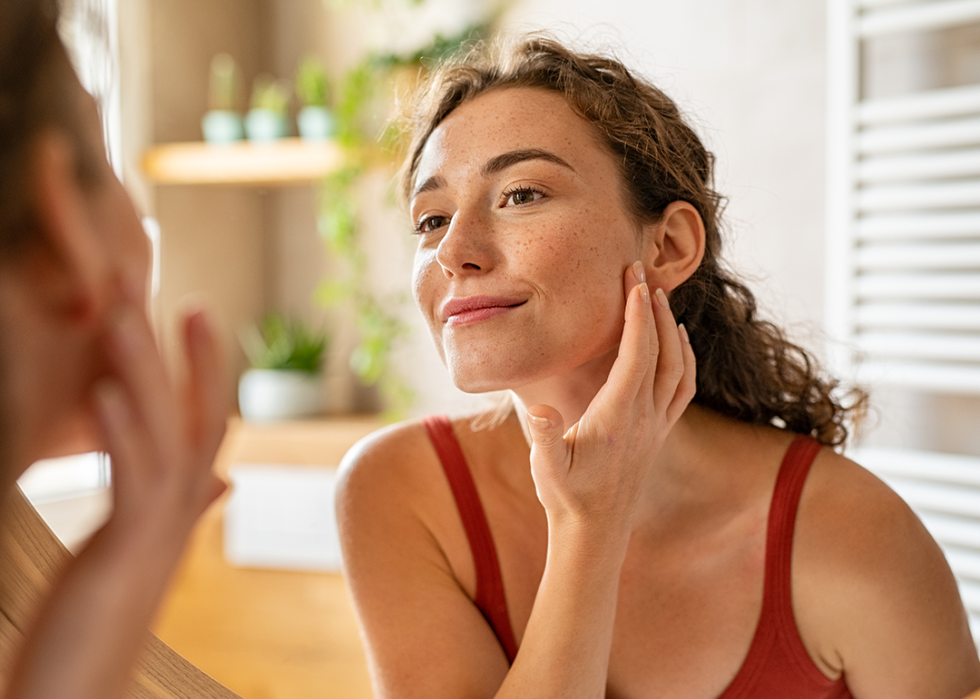
3 ways plant-based diets affect the health of your skin
This story originally appeared on Thistle and was produced and distributed in partnership with Stacker Studio.
3 ways plant-based diets affect the health of your skin
"Going plant-based" may seem like a fad at the moment. But with $8 billion in sales and a 45% increase in market growth between 2019 and 2022, according to the Plant Based Foods Association, this trend seems to be here to stay.
While eating a vegan diet eliminates all animal products, plant-based eating is not quite as limiting. A plant-based diet focuses primarily on plants, such as fruits, vegetables, nuts, seeds, and whole grains, with the occasional animal product (such as dairy, fish, or meat).
There's been abundant emerging research regarding the health benefits of plant-based eating, which researchers have linked to lower rates of heart disease, type 2 diabetes, and certain cancers. A more plant-forward diet also has added benefits for skin health. Diet affects gut health and the immune system, which can impact the skin, a relationship referred to as the gut-skin axis in the scientific community.
To determine how exactly a whole food, plant-based diet can promote skin health, Thistle gathered the latest nutrition research on the topic and consulted a clinical nutrition expert.
Read on to learn about three skin-related benefits of a plant-based diet.

Reducing acne
Topical treatments and medicines tend to be a go-to acne remedy, but research has also linked the benefits of plant-based eating patterns to reduced acne.
In a 2017 study from the University of California, Davis, published in the International Journal of Molecular Sciences, researchers concluded plant-based foods and supplements rich in fiber and polyphenols can serve as a natural solution for acne.
That's because of how skin health reflects gut health. The gut microbiome is made up of trillions of microorganisms that stimulate the body's immunity to diseases. An imbalance of those microorganisms can result in gut dysbiosis, which can lead to skin conditions like acne, as well as psoriasis, dermatitis, dandruff, and even skin cancer.
A 2023 review in the scientific journal Nutrients confirmed that vegetables and fruits, staples of a plant-based diet, have antioxidant and anti-inflammatory properties that positively affect the gut microbiome and, therefore, can promote clear skin.

Preventing signs of aging
Eating a variety of plants helps combat skin conditions like acne, but it can also have long-term effects on signs of aging.
A 2020 review published in The Journal of Clinical and Aesthetic Dermatology concluded that following a whole-food, plant-based diet provides rich antioxidants like vitamins A, C, and E, helping to prevent cellular damage and keeping skin firmer for longer.
When people consume some fruits and vegetables, their nutrients synthesize collagen, a protein that promotes skin elasticity and firmness. "Compared to a diet rich in ultra-processed food, plant-based food is rich in vitamins like C and E, as well as lysine, beta-carotene, and antioxidants that can help with the production of collagen leading to a more youthful-looking skin," registered dietician nutritionist Huma Chaudhry explained.

Decreasing risk of inflammatory skin disease
Research continues to show a connection between diet and inflammatory diseases, including certain skin diseases. A 2022 review in Nutrients evaluated 181 studies, including 45 case-controlled studies, to define the connection between diet and inflammatory skin diseases. The researchers found nutrition does have a conditional role in conditions like psoriasis, atopic dermatitis, vitiligo, and alopecia.
Plant-based eating has a positive correlation with these types of inflammatory skin diseases. The previously mentioned 2023 review published in Nutrients evaluated how following a plant-based diet can specifically benefit the symptoms of these diseases. The researchers concluded that plant-based diets can decrease symptoms and risks due to the positive influence these diets have on the gut microbiome.
Story editing by Jaimie Etkin. Copy editing by Kristen Wegrzyn.



